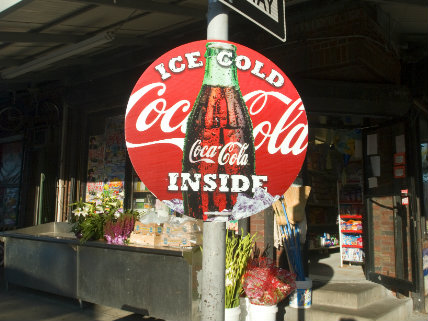With Sales Depressed by Soda Tax, Philly Grocers Look to Cut Jobs as Mayor Blames 'Greedy' Soda Industry
One of the city's largest beverage distributors is planning to cut 20 percent of its workforce; grocery stores across the city are also planning to shed jobs.

It's one of those basic laws of economics: when you tax something, you get less of it.
Philadelphia is getting a crash course in what that looks like. A little less than two months after the city imposed a new tax on sugary drinks, sales of those beverages are down—way, way down—and revenue collections are too.
It's hard to have much sympathy for the city, which probably deserves to come up short on the revenue side as punishment for implementing such an obviously misguided policy. Unfortunately, the soda tax is doing more than just wrecking Mayor Jim Kenney's budget projections—it's also going to cost some Philadelphia residents their jobs.
One of the city's largest beverage distributors is planning to cut 20 percent of its workforce, Philly.com reports, and grocery stores across the city are also planning to shed jobs to make up for declining sales. It appears that the tax is causing some shoppers to drive beyond the city's borders in order to do their grocery shopping (who could have seen that coming, right?).
"In 30 years of business, there's never been a circumstance in which we've ever had a sales decline of any significant amount," Jeff Brown, chief executive officer of Brown's Super Stores, told Bloomberg. "I would describe the impact as nothing less than devastating."
For now, Kenney and other city officials seem unfazed—dismissive, even—of the problems caused by the new tax. A city spokesman told Philly.com that no one knows whether low sales figures and predicted job losses are anything more than "fear-mongering to prevent this from happening in other cities."
Kenney put an even finer point on it.
"I didn't think it was possible for the soda industry to be any greedier," Kenney said in an emailed statement to Philly.com reporter Julia Terruso. "They are so committed to stopping this tax from spreading to other cities, that they are not only passing the tax they should be paying onto their customer, they are actually willing to threaten working men and women's jobs rather than marginally reduce their seven figure bonuses."
It's not the first time Kenney has tried to ignore basic economics when it comes to the soda tax. A few weeks ago, he blamed grocery stores and restaurants for "price gouging" when they increased prices for sugary drinks to make consumers pay for the cost of the tax (the tax is technically applied on the transaction between distributors and retailers, but, like all other taxes, it gets passed along).
If Kenney's right, then soda manufacturers and distributors are engaged in a massive conspiracy with grocery stores and eating establishments to lie to city tax collectors, fire workers, and craft a fake narrative about the devastating effects of the Philadelphia soda tax. I suppose that's possible—all those groups did oppose the tax before it was passed, after all—but it seems far more likely that all those groups, and the city itself, are experiencing a first-hand lesson in how economic incentives work.
Consumers who don't want to pay an extra 1.5 cents per ounce for their favorite sugary drinks have a strong incentive to avoid buying soda (or juice, or iced tea, or sports drinks) in Philadelphia. They're leaving the city to buy soda, and doing the rest of their grocery shopping outside the city too. That leaves grocery stores with less revenue and creates an incentive to cut costs, which could mean laying off workers.
Or, as Pennsylvania State Rep. Stephen Bloom, a Republican, put it on Twitter:
Economics is to Politics as Gravity is to Jumping. https://t.co/BuYb7kuIFe
— Rep. Stephen Bloom (@RepBloom) February 22, 2017
Philadelphia planned to use the money from the tax to fund a new pre-K program in the city's public schools. That program launched even before the tax went into effect, but revenue projections after the first two months suggest the city might be left with a deficit.
Per month, Philadelphia expects to collect about $7.6 million from the tax, but in collections totaled just $2.3 million in January, City & State Pennsylvania reported this week, citing a city report.
There are a few caveats here. Some stores and restaurants are suspected of stockpiling sodas in December, before the tax took effect, and might have been selling off those untaxed sodas in January. That would lower the city's collections in the first month, but would suggest that revenue should rebound in the future. Philadelphia officials told City & State Pennsylvania that they suspect a 10 percent noncompliance rate is similairly dragging revenue collections down.
Even so, collections would have to double—and then some—in future months to reach expected levels. Given what grocers are saying about sales, well, that seems unlikely.
Philadelphia is the biggest city in the country to experiment with a regressive soda tax, but others already are looking to follow suit. Before they jump on the idea, they might want to see how this plays out.
So far, at least, Philadelphia's soda tax is looking less like a model to copy and more like a cautionary tale.


Show Comments (141)